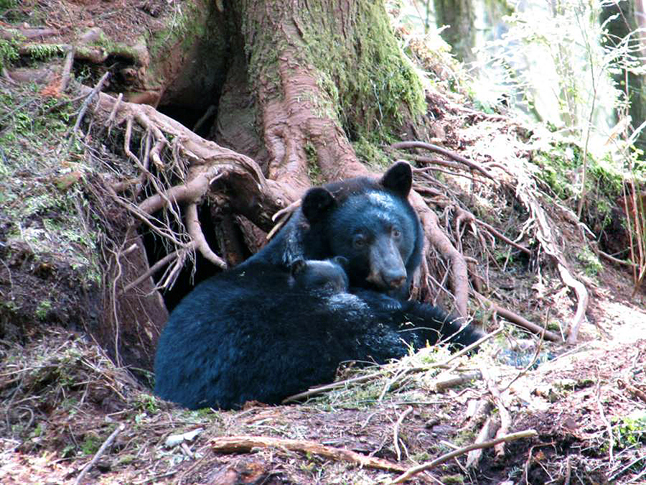

Spring is here! The snow is almost gone; grass raking, garden turning and bike riding are upon us. With the low snow year and the early signs of spring, people have been asking me what we can expect for bears this season. Will the bears be up foraging for food earlier this year? Will we see them in town sooner?
These are difficult questions to answer. Bears are very individualist. Bears den at a wide range of elevations and in many different types of dens ranging from natural caves, snow caves, hollow trees or logs, or in shallow pits they’ve dug out beneath tree roots. There is not a set time that a bear will wake and leave their den. Bears have been known to leave their dens, wander around a bit and then return to slumber. In general, bears emerge from their dens from March until May with the male bears coming out first, and females with cubs making the latest exit. Many of the black and grizzly bears in the area may already be up and have started foraging for tasty spring morsels. It is unclear whether they will be up earlier this year, although it would seem likely given the decreased snow pack and warmer weather. There was a bear sighting in Kamloops at the beginning of March.
In the late fall and winter, during a period known as “denning”, bears will have gone four to six months without eating, drinking or urinating. Bears will have lost between 15 and 40% of their body fat. Females with new born cubs will have been nursing their offspring since birth in mid-January to February. While you would think they would be ravenous and ready to eat any food in sight (I know I would be), this is not the case. In fact, they remain in a sort of hibernation-like state for a few weeks, prior to beginning the search for food.
Spring food includes herbaceous plants in the early stages of greening, with easily digested shoots and leaves that provide high nutrition, roots, insects and mammals.
Of course bears are opportunistic feeders and are looking for what ever they can get. This may also include composters that have been sitting over the winter, garbage, birdseed and greasy barbeques. The first bear sightings reported for Revelstoke in 2007, 2008, and 2009 began about the third week in May. Although 2009 was a quiet year for bears in Revelstoke overall, there were just as many calls in the spring as in the previous two years. A big find for bears at this time was garbage and birdfeeders.
Will we see bears in town earlier? Time will tell, but let’s be ready. The time to act is now! Bears will wander into town. Don’t wait for the bear to get into your garbage or birdfeeder. When a bear is rewarded with garbage or other people related food, the bear will continue to search for more, similar food in the area.
It’s time to, once again:
- Store your garbage in a secure place that is not accessible to bears, or take it to the dumpster at Public Works during business hours;
- Manage composters that have been sitting all winter. Turn, take out finished compost and add some browns, such as dried grass;
- Bring in your birdfeeders; there is now plenty of natural food available for birds;
- Feed your pet inside and store pet food in a secure place; and
- Clean your barbeque; ensure you burn off any food residue with each use.
Let’s keep our community a safe place for people and ensure that bears wandering through don’t find food. If you do see a bear, please report the sighting to Revelstoke Bear Aware at 250-837-8624. Reporting sightings help Revelstoke Bear Aware to more effectively direct the Bear Aware message in the community.
If you have any questions or concerns, please give Revelstoke Bear Aware a call, send an e-mail to beaware@telus.net or visit our website at www.revelstokebearaware.org.
Penny Page-Brittin is the Revelstoke Bear Aware Coordinator



